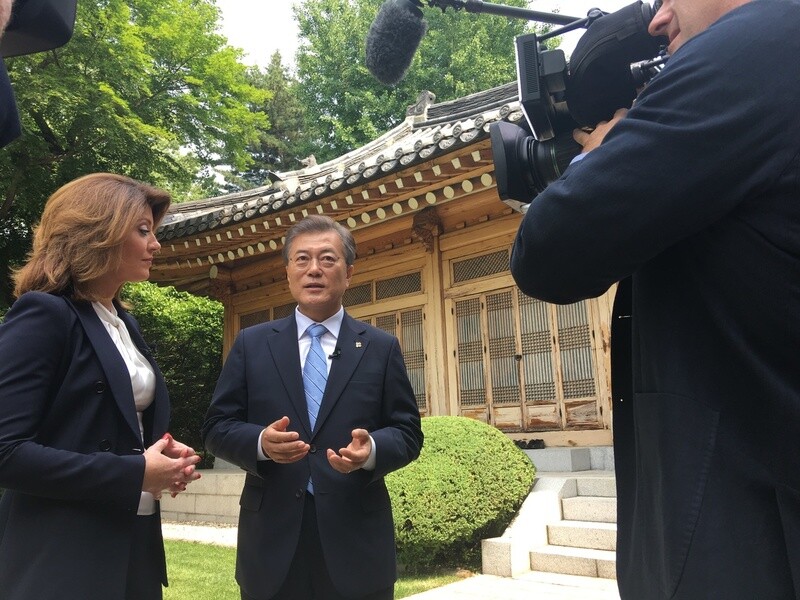hankyoreh
Links to other country sites 다른 나라 사이트 링크
[Editorial] South Korea’s leading role in solving the North Korean nuclear issue

President Moon Jae-in shared his new administration’s strategic approach toward North Korea in interviews with the Washington Post and CBS on June 19-20. Moon also proposed a two-stage denuclearization approach involving a “nuclear freeze” first to halt further North Korean nuclear and missile advancements, followed by termination of the North’s nuclear program. Moon’s suggestions strongly hinted at efforts to reassure the Donald Trump administration ahead of the summit on June 29-30. This was especially apparent in his repeated references to “close coordination with the US.”
But Moon also made it clear he was leaving the door open for dialogue, stating repeatedly that he was willing to visit North Korea and meet with leader Kim Jong-un “if the conditions are appropriate.” The message, which comes as US opinion toward North Korea has soured intensely over the death of US student Otto Warmbier, stressed that the point of pressure on Pyongyang was to achieve dialogue.
The message from Moon that has drawn the most attention concerns South Korea’s role in resolution of the nuclear issue. Leaving it up to major powers like US and China to find a solution to Korean Peninsula issues increases the likelihood the situation will be dictated by their global strategies. If anything, the emphasis on Seoul’s role seems long overdue, given South Korea’s economic scale and international stature. As Moon noted, inter-Korean relations have been far more peaceful - and relations between the US and North Korea relatively positive - whenever Seoul has taken an active, guiding role in relations with Pyongyang. It’s a good approach in terms of both national interests and policy efficiency.
But a stronger role from Seoul will take more than just rhetoric. The South Korean government now has to show it is capable of getting North Korea to take part in different forms of dialogue and negotiation. Moon also has to bring Trump on board with this approach to the North at the upcoming summit and see to it that policies are adopted without differences between Seoul and Washington.
Moon also addressed the topic of wartime operational control, noting that South Korea is a sovereign state and saying wartime control should be handed over at an appropriate time. It makes complete sense he would show his commitment to gaining control, and the administration now has to get to work on practical preparations for it. On the THAAD deployment issue, Moon stressed the importance of environment impact assessment procedures, but also left some room by insisting this did not mean the deployment would be postponed or the decision overturned. These are the chief issues right now between Seoul and Washington, and they will need to be discussed frankly at the summit to reach a forward-thinking conclusion. When it comes to THAAD, it‘s important that the decision be based on our national interests rather than the US or China’s military strategy.
Please direct questions or comments to [english@hani.co.kr]

Editorial・opinion
![[Column] Park Geun-hye déjà vu in Yoon Suk-yeol [Column] Park Geun-hye déjà vu in Yoon Suk-yeol](https://flexible.img.hani.co.kr/flexible/normal/500/300/imgdb/original/2024/0424/651713945113788.jpg) [Column] Park Geun-hye déjà vu in Yoon Suk-yeol
[Column] Park Geun-hye déjà vu in Yoon Suk-yeol![[Editorial] New weight of N. Korea’s nuclear threats makes dialogue all the more urgent [Editorial] New weight of N. Korea’s nuclear threats makes dialogue all the more urgent](https://flexible.img.hani.co.kr/flexible/normal/500/300/imgdb/original/2024/0424/7317139454662664.jpg) [Editorial] New weight of N. Korea’s nuclear threats makes dialogue all the more urgent
[Editorial] New weight of N. Korea’s nuclear threats makes dialogue all the more urgent- [Guest essay] The real reason Korea’s new right wants to dub Rhee a founding father
- [Column] ‘Choson’: Is it time we start referring to N. Korea in its own terms?
- [Editorial] Japan’s rewriting of history with Korea has gone too far
- [Column] The president’s questionable capacity for dialogue
- [Column] Are chaebol firms just pizza pies for families to divvy up as they please?
- [Column] Has Korea, too, crossed the Rubicon on China?
- [Correspondent’s column] In Japan’s alliance with US, echoes of its past alliances with UK
- [Editorial] Does Yoon think the Korean public is wrong?
Most viewed articles
- 1[Column] Park Geun-hye déjà vu in Yoon Suk-yeol
- 2Thursday to mark start of resignations by senior doctors amid standoff with government
- 3[Editorial] New weight of N. Korea’s nuclear threats makes dialogue all the more urgent
- 4Will NewJeans end up collateral damage in internal feud at K-pop juggernaut Hybe?
- 5Why Korea shouldn’t welcome Japan’s newly beefed up defense cooperation with US
- 6[Guest essay] The real reason Korea’s new right wants to dub Rhee a founding father
- 7Kim Jong-un expressed ‘satisfaction’ with nuclear counterstrike drill directed at South
- 8[Column] ‘Choson’: Is it time we start referring to N. Korea in its own terms?
- 9N. Korean hackers breached 10 defense contractors in South for months, police say
- 10[Column] Yoon’s first 100 days should open our eyes to pitfalls of presidential system